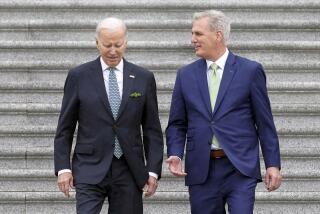NEWS ANALYSIS : Maastricht Pact Means Stability, Big Plus for U.S. : Europe: American and Japanese companies and investors have reason to hope that the French vote ‘yes’ on Sunday.
- Share via
If French voters on Sunday approve a plan for European economic unity that produces a stable and strong Europe with a single currency, companies and investors in the United States and much of Asia would have reason to exclaim, “Vive la France!”
If implemented as designed, the Maastricht treaty for European economic and political integration would create the kind of stability that would help reduce the threat of European protectionism and create a more secure and attractive climate for investment in Europe, according to economists and business executives.
The planned economic and monetary unification of the 12-nation European Community would eliminate the need for the kind of currency speculation that leads to big swings in the value of the dollar and Japanese yen and make international trade more predictable, they added.
On the other hand, the U.S. and Japanese economies would not be hurt if the EC failed to further integrate its economies--the United States and Japan have had a trade surplus with Western Europe--unless the failure of unification further depressed European economies.
Maastricht calls for the establishment of a central European bank and more coordination on economic policy. Such provisions would constrain members of the EC, leaving each member nation less room to adopt their own protectionist policies.
EC members already have uniform tariffs on most manufactured goods, and that uniformity would be ensured under Maastricht. However, some EC members have protectionist policies on agricultural goods, and there are no guarantees that such protection would end under Maastricht.
The Maastricht plan would also require EC countries to more closely coordinate their positions on political and security matters, an objective designed to foster more unity on crucial policies.
If such unity were achieved, the EC would be better equipped to deal with crises such as the civil war that has fractured a once-united Yugoslavia, said Ella Krucoff, a spokeswoman for the Delegation of the EC Commission, a Washington office that serves as an embassy for the European group.
Such stability is important because investors tend to worry that turmoil in one area will spread and hurt the economies of neighboring countries, said A. Nicholas Filippello, chief economist at the St. Louis-based chemical giant Monsanto and former adviser to Murray Weidenbaum during Weidenbaum’s stint as President Ronald Reagan’s chairman of the Council of Economic Advisers.
“American investors operate on perceived risk and, if they see a situation as less risky and more controllable, you can expect greater investment,” Filippello said.
There would also be more predictability and less risk in exchange rates if the EC proceeds with Maastricht provisions calling for the establishment of a single, common currency by 1999. The plan for a single currency is designed to prevent the kind of crisis that gripped the 12-nation coalition this week when Britain and Italy declared they would temporarily abandon an exchange rate mechanism that had maintained somewhat predictable valuations among Europe’s currencies.
“Currently, it’s more difficult for American companies to develop marketing strategy for Western Europe because firms have to consider various exchange rates--and some of these rates shift widely,” said Gregory Mignano, executive director of the California State World Trade Commission.
The common currency would reduce the amount of speculation--hedging that occurs when certain EC nations experience economic problems. Last week’s crisis created instability that prompted currency traders to buy dollars for security--driving up the value of the greenback and making U.S. products more expensive in Europe. Conversely, when the dollar swings very low versus certain EC currencies, it makes products from those European countries more expensive in the United States.
The currency swings this week prompted U.S. Rep. Jim Leach (R-Iowa) to ask the General Accounting Office to probe the role of speculators in currency markets.
Leach said the GAO’s analysis should indicate “who the winners and the losers in the currency speculation game have been and the ramifications of this week’s currency crisis on international trade in general.”
Although Europe’s currency crisis may delay EC moves toward a common currency and further political integration, Japanese officials believe that Europe will continue its current push for a single market.
“The move toward unifying the market won’t end,” a Foreign Ministry official said.
That is good news for Japanese businesses that have benefited from Europe’s moves toward building a single market.
“Europe has been moving toward single standards on products; that’s good for Japanese business (because) it means one product can be sold in 25 countries” without being adjusted for local differences, the official said.
Although Japanese businesses were initially concerned about the development of a “Fortress Europe,” a trading bloc that would make it more difficult for Japanese firms to sell and invest in the EC, Japanese officials now say those fears have proven unfounded. Last year, Japan had a $36-billion trade surplus with the EC. The United States had a surplus of $25 billion with EC nations.
White reported from Los Angeles and Helm from Tokyo.
More to Read
Sign up for Essential California
The most important California stories and recommendations in your inbox every morning.
You may occasionally receive promotional content from the Los Angeles Times.










